- Home
- Tim Powers
Three Days to Never: A Novel Page 21
Three Days to Never: A Novel Read online
Page 21
He thought of that life as Life A.
And then in the early months of 2006 he had begun to have vivid hallucinations of a different life, a Life B. In this other life he had not married Amber, and Daphne was still alive, still with him, and the two of them were living in a trailer park on Base Line. Moira, a widow by this time, had long since bought out his share of Grammar’s house, and was living in it, and had got restraining orders against both him and Daphne. Daphne was thirty-one, and an alcoholic, and she hated her alcoholic father. And, truthfully, by that time he had hated her, and himself too.
In both lives twelve-year-old Daphne had watched Grammar’s movie, helplessly, all the way through, while he had been up the hall in his office grading papers; when he had eventually come down the hall to make dinner he had found Daphne still staring at the blank screen. He had ejected the tape and hidden it. That night Daphne had begun to have difficulty swallowing her food.
And though in his original life, Life A, Daphne had choked to death on the floor of Alfredo’s the next day, in the intrusive hallucinatory Life B he had punched a hole in her throat, and she had not died; but when she had recovered from the surgery she had written u cut my throat…i hate you on the pad beside her hospital bed. And from then on she had seemed to be possessed by a spiteful, hateful devil.
He could see now that it had been merciful, in the original story of his life, that she had died on the restaurant floor.
The Life B hallucinations had become so frequent and prolonged that he had had to take a leave from teaching, and eventually he honestly didn’t know which life was his real one.
He was the single father of the adult Daphne as often as he was the childless husband of Amber.
Then he was simply living with Daphne in the trailer, and the life with Amber was a less and less frequent dream. And by April 2006 those dreams had stopped. He was stuck in the drink-fogged trailer life with his angry, drunk, adult daughter—though he could still remember his original life.
Why would my past change, in this way? he wondered. Why did this 1987 Frank Marrity do the tracheotomy yesterday, when in my original time line I did not do it?
It must be that the Harmonic Convergence, that sudden drop in worldwide mind pressure, caused a crack in the continuity, allowed a brief gap—like an unstable seam between two pours of cement—in which some new variable could make things resume in a different way.
So in this skewed history, Marrity did not marry Amber; by the time Daphne was twenty-two, she was a dedicated alcoholic, and so was he; and when she was twenty-seven, in 2002, she took his car keys and he blundered out of the trailer to stand behind the battered Ford Taurus to prevent her from taking it.
He shifted his bad leg now to a new position on Grammar’s bedspread. Standing behind the car had been a mistake.
And so he had made a desperate bid to save Daphne, and himself—to start an entirely new life, a Life C, a third roll of the dice.
He had remembered the questions the secret agencies had asked him in both previous lifetimes, and those questions had led him to the discovery of who his great-grandfather had been—and had then led him to the study of quantum mechanics and relativity and Kabbalah. He had stolen some Einstein letters from Grammar’s house, which by then had been Moira’s.
And then he had actually used the machine in Grammar’s Kaleidoscope Shed and jumped back in time and intruded on his thirty-five-year-old self and the twelve-year-old Daphne, and pretended to be his own lost father.
Pretending to be his own father had been even more difficult than he had imagined it would be—claiming to be gay had been much easier than claiming to be that evil old man.
Daphne had noted the resemblance between them: the old and young Frank Marritys! He had hoped that Daphne might survive this time, as the sweet child she had been, if there were no choking and therefore no throat cutting. And he had got his younger self to promise not to go to an Italian restaurant on that fateful day.
And of course he had gone to Alfredo’s himself, ready to chase them away if they nevertheless tried to eat there—but when they hadn’t arrived at noon, as he clearly remembered doing, nor at 12:30 or 12:40, he had relaxed and sat down and had lunch and a few beers. Fate had evaded him by sending them in an hour late.
And then Daphne choked, and her young father did the tracheotomy.
The old Frank Marrity rolled to a new position on Grammar’s bed. He should have…broken Marrity’s leg, set his truck on fire, called in a bomb threat to the restaurant.
Last night—it tormented him now to remember it—last night he had been certain that Daphne must have died at the hospital—a hemorrhage, error in anestheic, a mis-prescription, it didn’t matter. The feeling of deliverance had been overwhelming.
He had been sure she had died because he had experienced half an hour of restoration, starting when the three cars had bracketed him on Base Line, and the Rambler had behaved so oddly—for a blessed thirty minutes after that, his right leg was strong and free of pain, and he was healthy, not weakened by years of heavy drinking.
After the incident on Base Line, he had found that he was on another street entirely, but he had got his bearings when he’d come to Highland Avenue, and he had driven to the Arrowhead Pediatric Hospital full of bubbling optimism.
He had been ready to begin prepping Marrity for the next nineteen years—marry Amber, bet on the winners in the NFL and NBA and the Stanley Cup, buy stock in Dell and Cisco and Microsoft and Amazon, and get out of it all by 1999 and then put the money in T-bills and insured securities—buy many copies of the first edition of Harry Potter and the Sorcerer’s Stone, and don’t be in New York City on September 11, 2001. To this 1987 Frank Marrity, 9/11 still meant the emergency phone number.
It wouldn’t have been precisely the same as the happy life with Amber that the old man remembered, but it should have been acceptably close. And it would have been affluent.
Of course neither of the Marrity-lives the old man had experienced had included a visit from his long-missing “father.” And in neither of the remembered lives had the semiblind woman tried to shoot him!
And there were a couple of other discrepancies too between this young Marrity’s life and what the old man remembered. In neither of the time lines he had lived through, the happy one or the miserable one, had Grammar’s VHS tape burned up. He had been surprised to see the scorched VCR lying in the grass outside Marrity’s kitchen door, yesterday morning. And neither Daphne nor this young Marrity should know anything about a connection with Albert Einstein yet; he had not learned of it until 2006. But somehow Frank and Daphne did already know about it.
And why had they been an hour late for lunch yesterday? Urgent housework that couldn’t wait?
And then at the hospital he’d seen that Daphne was still alive after all, and decrepitude had fallen onto him again like a waterlogged plaster ceiling. When he had struggled weakly to his feet, Daphne and Marrity had been gone, Daphne’s IV tube swinging free and dripping dextrose and sodium chloride onto the floor, and he had had to curse his way past the shouting nurses and limp out of the hospital.
He hoped to be able to find the foreign crowd, the sunglasses girl and her friends, and make a bargain with them—to get them to leave Marrity alone. He could tell them priceless facts about future events, in exchange for that. Even give them Grammar’s time machine, for that.
He could try to do that much for his younger self, at least.
Lying on Grammar’s bed now, he sniffed—then hiked himself up on his elbows. The raw reek of gasoline was overpowering the scent of the jasmine, and for a breathless instant he thought some recoil effect was pulling him back to the moment of his arrival in the gasoline-fumey Kaleidoscope Shed—with the dozen impossible infants waving their arms in the weeds outside—and then he heard young Frank Marrity’s voice through the open window behind his head.
“There’s a cigarette in it!” Marrity said.
Then the old man bared his t
eeth and winced, for twelve-year-old Daphne said, “What, in the gasoline?”
“Right, see, that’s the filter, and that’s the paper that used to be around it.”
“Who’d throw a cigarette in a gas can?”
“Somebody who thought it would set it on fire. I bet she laid a lit cigarette across the open mouth of the can, figuring when it burned down it’d fall in. Which it did. But then it just went out.”
“You shouldn’t pour it into the dirt. I think that’s illegal. Why didn’t the cigarette set the gas on fire?”
“The can was nearly full. I guess there wasn’t enough vapor. We can’t just leave it sitting here; and we can’t take it to a gas station for, for whatever the proper disposal is, on a bus.” The old man heard the clang of the empty gas can being put down on the concrete of the patio. “I wouldn’t have taken bets on it not catching fire, though,” Marrity’s voice said. “I can see why she thought she had reliably burned down the shed. She must have left too fast to see that it hadn’t worked.”
The old man in the bedroom shivered in sudden comprehension—if Grammar’s makeshift incendiary device had worked, he would have been jumping straight into the middle of an inferno, at noon on Sunday, instead of just into a heady reek of gasoline fumes. Even the fumes had made him scramble out of the shed as fast as he could.
“Poor old Grammar,” said Daphne. “I wonder what was going on.”
“I think we’ve got to figure out what was going on, before somebody else tries to shoot me.”
“Let’s go look at the shed,” said Daphne, her voice moving away from the window.
Old Marrity swung his legs off the bed. In both his previous lifetimes he had eventually dug up the gold wire, and in horrible Life B he had sold his trailer to get gold wire to replace it and rewire the time machine, but he couldn’t let them disassemble it now—they might just wreck it, and if the machine was gone, could he still have jumped back here? He couldn’t figure out the logic of it, but he didn’t want them fooling with the machine.
“Wait!” he shouted, limping toward the bedroom door.
He hobbled past the washing machine and wrenched at the dead bolt on the back door; finally he got it back and pushed the door open, squinting at the bright sunlight in the yard. It occurred to him that he hadn’t shaved in two days, and his jowls must be bristling with white stubble.
Daphne and his younger self were standing in the weedy yard gaping back at him.
“Wait,” he said again. And then he took a deep breath, not having any idea what he could say next.
Sixteen
Sturm and Drang had driven Bennett to the Bank of America on California Street and led him inside, and there they really had given him six cashier’s checks, each for $8,333; Bennett had tucked the envelope into his inner jacket pocket, feeling dizzy and anxious. The bank happened to be only a couple of blocks from Grammar Marrity’s house.
Then they had driven out of that neighborhood, north to the cedar-shaded parking lot at the Holiday Inn by the Civic Auditorium. Sturm had parked next to a big brown Dodge van with a sliding door in the side, which had rolled open when Sturm got out of the car and knocked on it. From the passenger seat of the idling car, Bennett had been able to see three burly young men and a dark-haired woman in sunglasses in the van; white-haired Sturm had conferred with them for a few moments, then had got back into the car and driven out of the lot, eyeing the rearview mirror to make sure the van was following. The air-conditioning was uncomfortably cold, and somehow the car smelled of burnt fabric.
“Where are we going?” Sturm asked now, without looking sideways at Bennett.
“Uh, 204 Batsford,” said Bennett. “It’s two blocks south of the bank we were just at. What burned in here?”
In the backseat, Drang lifted a shoe box from beside him and held it forward, lifting the cardboard lid.
Bennett hitched around in his seat to look, then recoiled from the little blackened figure inside. “What the hell is that?” he barked. The burnt smell was gagging him now.
“Your niece’s teddy bear, we assume,” said Drang, clearly pleased with Bennett’s reaction. He put the lid back on the box and set it down on the floor by his feet. “It was buried in Marrity’s yard. She apparently burned it up.”
“When we get there,” Sturm went on, “don’t mention any of this about the sale of the grandmother’s property. Just get Marrity and his daughter, both, to come to the van. Tell them you’ve got a bicycle for the girl or something.”
From the backseat, Drang said cheerfully, “We can take them from there.”
Sturm glanced at Drang in the rearview mirror. “When we get there,” he told the fat man, “you go back and wait in the van.”
Drang raised his eyebrows. “You think I look alarming?”
“Better that they see only one stranger.”
Bennett shifted uncomfortably under the front seat’s shoulder strap, wishing he could lean forward and put his face into the cold air coming from the dashboard blowers. “Why did you bring the, the burned-up teddy bear?”
Sturm scowled, as if he wished Drang had not shown Bennett the bear. “It might mean something to the girl,” he said.
Bennett realized he was nodding, and he made himself stop it. “You could just let me go—I mean, I can get a cab to get back to my car, then. After.” He rubbed his hand over his mouth, feeling sweat in his mustache. “When you’ve—”
“Okay,” said Sturm.
It occurred to Bennett that they were now paying him just for the delivery of Marrity and Daphne, and not for the things Grammar had wanted to sell—if in fact these men were going to let him keep the money, or even let him go.
I should have awakened Moira, he thought. She’d have stopped me. Why the hell couldn’t she have woken on her own?
Daphne stared at her grandfather, who was standing in the shade of the trellis looking like a bum. His white hair was all shoved up in the back, and she knew that when her father’s hair was that way it meant he’d been napping.
She was glad to see that he’d mostly recovered from whatever had happened to him at the hospital this morning. Over the door behind him was the wooden sign that read, Everyone Who Dwells Here Is Safe. She wondered if that sign was why he had come here.
“Wait?” said her father beside her. “Wait for what?”
Her grandfather was swaying in the patchy trellis shade.
“Don’t—go,” the old man said. “I was asleep, and I heard your voices. I—”
“Who was that woman who shot at me,” her father interrupted, “in the hospital lobby?”
“I don’t know—”
“You said, ‘She’s blind if you don’t look at her.’ Which was true. And she tried to kill Daphne and me an hour ago. Who is she?”
“Ach! She did? She’s a—a psychic. I haven’t spoken to her in years, I truly can’t imagine why she tried to kill you. I saved your life.”
Daphne’s father shifted his feet in the weeds. “It’s true, you did. Thank you. How do you know her?”
“She—she was part of a team that interviewed me once, after a, a bereavement—she’s with a secret agency—”
“Not a United States one,” said her father. “We talked to a man from the National Security Agency last night, and he told me not to speak to her.”
“You did? I never did, not the NSA. I—only want what’s best for you.”
Daphne noticed that he said it directly to her father. How about what’s best for me too? she thought.
“What sort of secret agency?” her father asked.
The old man sat down in a shaded wicker chair against the outside bedroom wall. “They were interested in something a…family member of mine had previously picked up, which didn’t belong to her.” He waved his spotty old hands inexpressively. “A family member who had in fact just died. I gave it to them, and they went away. They were psychics, they had a head—anyway, I didn’t argue with them, so I didn’t learn anything about t
hem.”
“When was this?”
The look the old man gave her father seemed defiant. “I was thirty-five.”
“You’re not saying you met that woman then,” Daphne’s father objected. “She’s only about thirty now.”
“I’ve met her,” said the old man. “Leave it at that.”
Marrity shook his head impatiently, then asked, “What did your family member take, that you gave to these people?”
The old man exhaled. “Call it a book. Call it a photo album. Call it a key.” He glanced at Daphne for the first time, then quickly looked away. To her father, he said, “Next time I’m inclined to save your life, remind me of how grateful you were this time.”
Her father paused, and Daphne looked up and saw him nodding. “Sorry, sorry. But you need to tell us all these things, not just the things you think we’ll believe. Why did you think Daphne was dead, this morning?”
“A nurse, I must have misunderstood what a nurse said. I don’t hear very well. Leave me alone.”
Marrity relented. “Okay. Do you want a beer?”
“They’re gone, if you mean Grammar’s.”
“Well, I’d like a beer,” Marrity said. He put his briefcase down on the cement porch slab to reach into his pocket. “Where’s Grammar’s car? I can drive it.”
“It—broke down. I took a bus here.”
Daphne doubted that. She and her father had taken a bus, and had got here a few minutes ago; her grandfather had been here long enough to have taken a nap. What did he do really, she wondered, steal a car? There’s an old car parked by the garage with the hood up. Do you need to open the hood to steal a car? Or to stop it, once you’ve driven it somewhere?

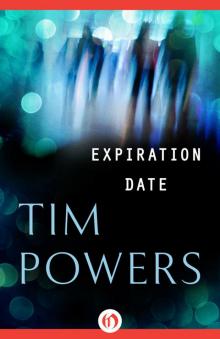 Expiration Date
Expiration Date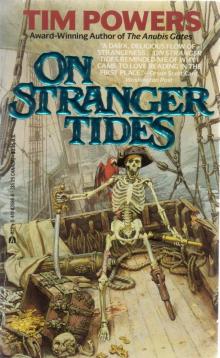 On Stranger Tides
On Stranger Tides Earthquake Weather
Earthquake Weather Forsake the Sky
Forsake the Sky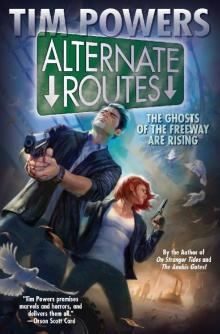 Alternate Routes
Alternate Routes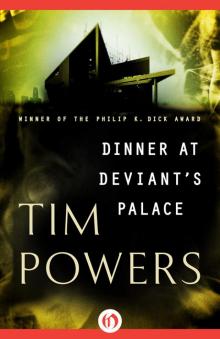 Dinner at Deviant's Palace
Dinner at Deviant's Palace The Stress of Her Regard
The Stress of Her Regard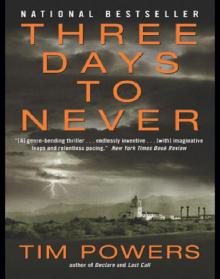 Three Days to Never: A Novel
Three Days to Never: A Novel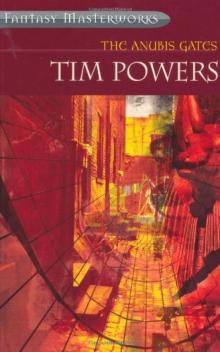 The Anubis Gates
The Anubis Gates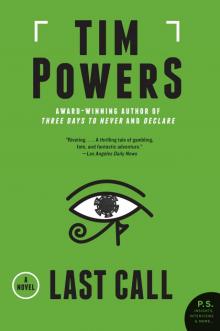 Last Call
Last Call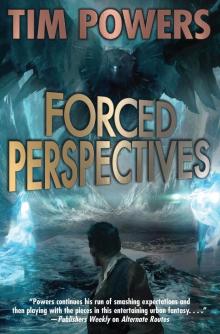 Forced Perspectives
Forced Perspectives Strange Itineraries
Strange Itineraries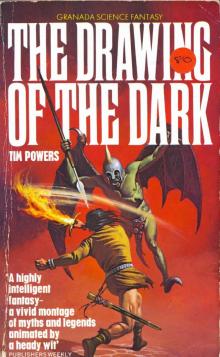 The Drawing of the Dark
The Drawing of the Dark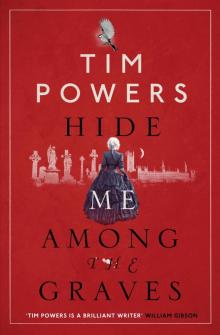 Hide Me Among the Graves
Hide Me Among the Graves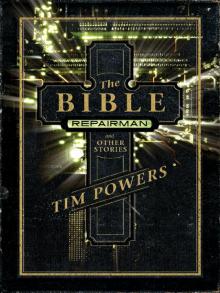 The Bible Repairman and Other Stories
The Bible Repairman and Other Stories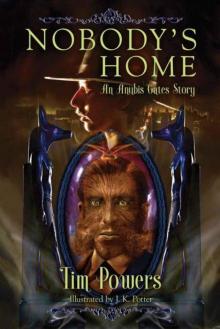 Nobody's Home: An Anubis Gates Story
Nobody's Home: An Anubis Gates Story More Walls Broken
More Walls Broken The Skies Discrowned
The Skies Discrowned Epitaph in Rust
Epitaph in Rust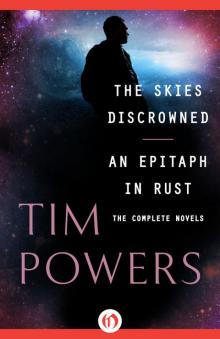 Skies Discrowned and An Epitaph in Rust
Skies Discrowned and An Epitaph in Rust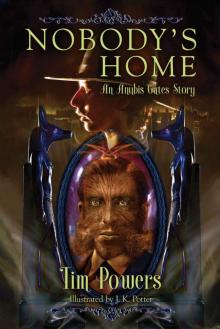 Nobody's Home
Nobody's Home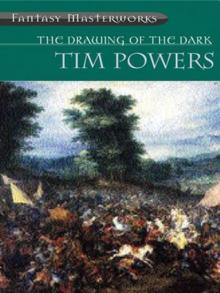 Drawing of the Dark
Drawing of the Dark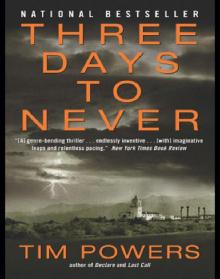 Three Days to Never
Three Days to Never